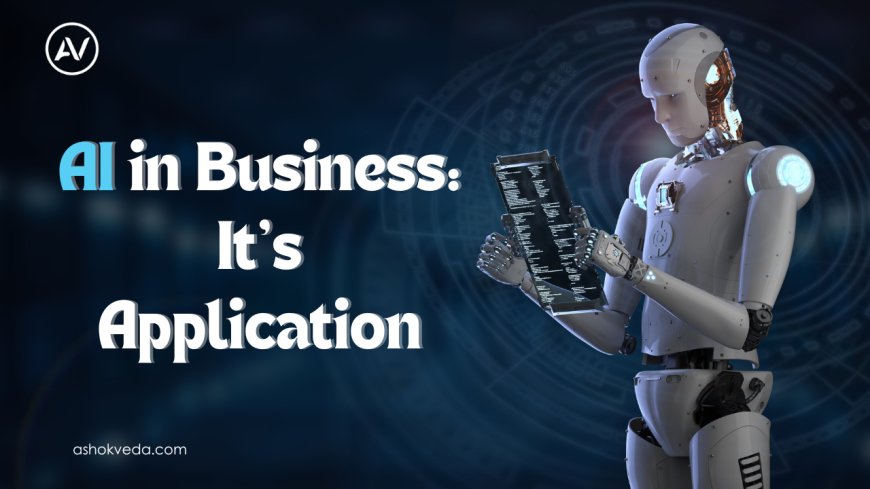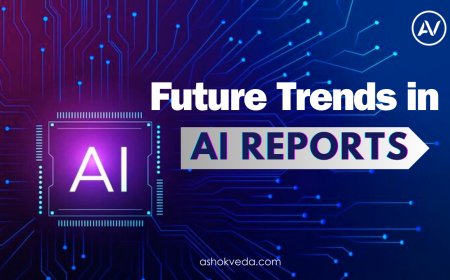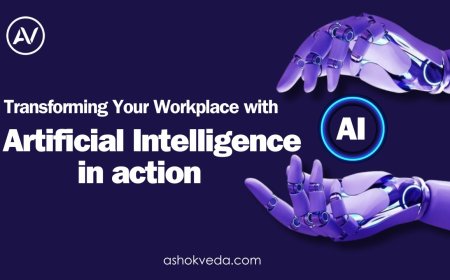Exploring Application of Artificial Intelligence in Business
Discover how artificial intelligence transforms business operations, enhancing efficiency, decision-making, automation, data analysis, and productivity.

Exploring the application of artificial intelligence in business is changing how companies run and compete in the modern world. AI is simplifying processes and helping companies make better decisions. Businesses can use intelligent automation for routine processes, improve AI in marketing strategies, and provide better AI in customer service by incorporating AI into their operations. Companies can analyze huge amounts of data, identify patterns, and make more informed decisions using machine learning in business. Exploring the application of artificial intelligence in business opens up fresh possibilities for creativity and provides instruments that can adjust to shifting market dynamics. AI significantly impacts customer service by enabling more rapid resolutions and customized interactions. AI is used in marketing to help develop more audience-specific, successful campaigns. In all cases, businesses have to employ AI if they want to remain competitive and satisfy the evolving expectations of their customers.
Understanding Artificial Intelligence
The goal of artificial intelligence, or AI, is to build machines with human-like thinking and learning abilities. These machines possess the ability to understand speech, identify patterns, and make judgments. Artificial intelligence (AI) improves with time through data-driven learning, which benefits us in numerous ways. For example, AI powers our phones' smart assistants and suggests movies we might like.
Key concepts of AI
Here are some key concepts of AI broken down into simple points:
-
Machine Learning: This is where computers learn from data without being explicitly programmed. They improve their responses by analyzing patterns in the data.
-
Neural Networks: These are systems modeled after the human brain that help machines learn and make decisions.
-
Natural Language Processing (NLP): This helps computers understand and respond to human language, making it possible for machines to communicate with us more naturally.
Benefits of AI in Business
Enhanced Productivity and Efficiency: AI automates repetitive activities, freeing up staff members to concentrate on more complicated work. As a result, tasks move more quickly, and more work may be completed in less time.
Improved Decision-Making Capabilities: AI analyzes data far more quickly than humans, which enables businesses to see trends and make well-informed decisions with more speed. This is particularly useful for tasks like strategy planning and market analysis.
Cost Reduction and Resource Optimization: Artificial Intelligence (AI) helps organizations use their resources more efficiently by automating jobs and streamlining procedures. Due to the reduction in time and money spent on human labor and error correction, this can result in significant cost savings.
Better Customer Experiences: By employing data to comprehend preferences and behaviors, AI can personalize customer encounters. Services may become more individualized as a result, satisfying clients and frequently boosting consumer loyalty.
Key Applications of AI in Business
Let's look at some key applications of AI in business.
Customer Service
-
Chatbots and virtual assistants: They are AI-powered technologies that can manage textual or audio consumer discussions. Day or night, they can offer prompt assistance or information because they are constantly accessible. They guarantee that clients receive the assistance they require promptly, whether it is by responding to frequently asked questions or offering advice on items.
-
Automated Customer Support: Customer support duties that can be automated by AI include ticketing, assigning customers' inquiries to the relevant department, and even making recommendations for solutions based on previous interactions. This improves the response time and frees up human agents to work on harder questions, increasing the support team's overall effectiveness.
Marketing and Sales
-
Predictive analytics and customer insights: AI analyzes data from previous interactions, purchases, and procedures to help organizations better understand their customers. By using this data to predict future trends and customer demands, businesses may avoid being reactive and instead turn active. A company might utilize this knowledge, for instance, to restock a product that is going to have higher demand.
-
Personalization and Targeted Advertising: AI can customize advertisements and marketing messages for specific consumers based on their prior online activity and preferences. Customers are more inclined to interact with the information when it has a personal touch since it feels more relevant to them. For example, AI can recommend new publications in a given genre to someone who regularly purchases books in that genre.
Operations and Supply Chain
-
Demand Forecasting and Inventory Management: Artificial intelligence predicts future product demands by analyzing historical sales data and current market patterns. This helps companies maintain the ideal stock level—enough to satisfy consumer demand without going overboard.
-
Process Automation and Optimization: AI can handle repetitive jobs such as placing supply orders and determining the most efficient delivery routes. This speeds up operations and lowers error rates. Also, AI continuously evaluates these procedures to identify even more efficient ways to carry them out, saving both money and time.
Human Resources
-
Talent Acquisition & Recruitment: AI speeds up the recruitment procedure by sifting through resumes promptly to identify applicants that closely fit the job specifications. This frees up HR to concentrate on interviewing candidates rather than reviewing applications.
-
Employee Engagement and Retention: By analyzing feedback and behavior, AI can keep track of employees' feelings about their jobs. Making needed policy changes, providing specialized training, or addressing burnout before it gets worse, helps HR and managers improve the work environment.
Finance
-
Fraud Detection & Risk Management: Artificial intelligence scans vast amounts of transaction data to identify unusual behaviors that may indicate fraud. This facilitates prompt action by banks and other financial institutions to prevent fraud before it causes damage. AI also makes it safer for businesses to lend money or make investments by evaluating factors like market conditions and an individual's financial history.
-
Automated Trading and Financial Analysis: AI is capable of making fast stock trades by utilizing market data to determine the optimal moments to purchase or sell. To predict trends and assist investors in making better decisions, it also monitors financial markets.
Future Trends in AI for Business
In the future, advanced AI technologies will be available, from emotion-sensing devices to AI that helps with creative tasks like music creation. These developments are opening the door for AI to change various industries. For example, AI may soon make it possible to identify diseases in the healthcare industry more quickly than with current methods, and it may also make it possible to monitor crop and soil health in agriculture more effectively. In the next ten years, AI is likely to play a major role in business operations across a wide range of industries. It will influence strategic choices and help operations like supply chain management, which will increase a company's ability to react quickly to changing consumer needs.
In conclusion, artificial intelligence (AI) is significantly improving a range of corporate processes, including supply chain management, human resources, marketing strategy optimization, and customer service automation. Furthermore, computerized trading and risk management are revolutionizing the financial industry. With new technologies creating new opportunities for innovation in industries like healthcare and agriculture, artificial intelligence (AI) is expected to become increasingly essential to company operations in the future. Businesses should benefit from this improvement by becoming more sensitive to changing market demands and more efficient.





































